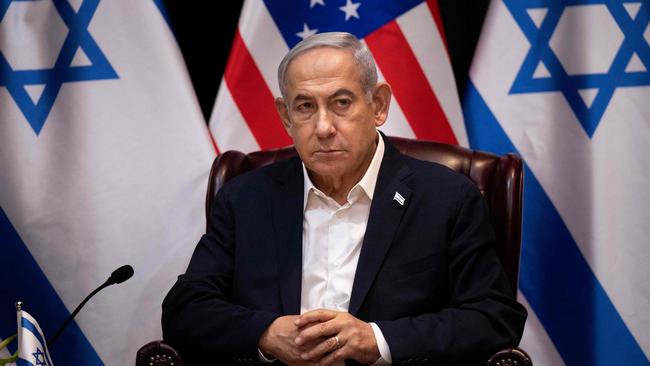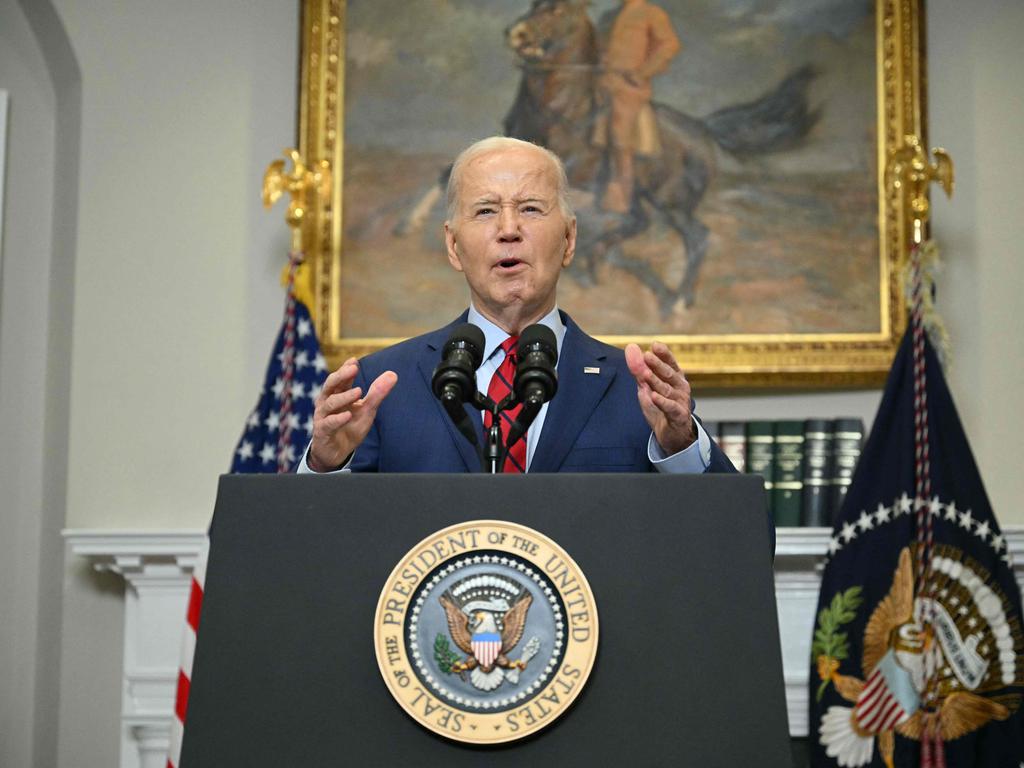Netanyahu signals openness to ceasefire but wants option to resume fighting
The Israeli leader showed cautious support for President Joe Biden’s initiative, but his position runs counter to demands by Hamas for a lasting ceasefire that secures the group’s survival.
Israel’s Prime Minister Benjamin Netanyahu showed cautious support for an initiative by US President Joe Biden to end the war in Gaza, with the Israeli leader saying on Monday that he is open to a temporary ceasefire to release hostages but wants a free hand to resume fighting Hamas.
Netanyahu’s position raises questions about whether an agreement can be reached. Hamas has said the two sides must agree to end the fighting now and is pushing for written guarantees that Israel won’t restart after an initial pause.
The Israeli leader told lawmakers in private remarks at the Israeli parliament that the wording in Israel’s current proposal for a temporary ceasefire to free hostages allows it to renew hostilities should later-stage talks about a permanent truce fail to progress, according to an Israeli official.
The Israeli military said Monday that it had concluded that four hostages who were kidnapped alive during the October 7 attacks that sparked the war had died in Hamas captivity. The military said it came to the conclusion based on intelligence, and had informed the hostages’ families. Israel says that 120 people who were taken on October 7 remain captive in Gaza, including dozens of dead hostages.
Netanyahu told the lawmakers that during later-stage negotiations for a permanent ceasefire he would insist on freeing all the hostages and destroying the military and governance capabilities of Hamas, according to the official. Those demands are likely to be nonstarters for Hamas, a US-designated terrorist organisation.
“The proposal allows Israel to preserve the right to renew fighting at any time Israel senses that the negotiations are futile,” the Israeli official said.
Biden appealed publicly to both sides on Friday to reach an agreement, outlining a path to ending the war that he described as an Israeli proposal, which US officials said was also close to Hamas’s demands.
To press for the deal, Secretary of State Antony Blinken made calls over the weekend to two top Israeli decision makers, Defense Minister Yoav Gallant and war cabinet member Benny Gantz, praising Israel for considering a ceasefire agreement and saying that the onus was now on Hamas to accept a deal.
Netanyahu must now navigate between the US pressure to resume negotiations and the insistence of his right-wing coalition members that the war in Gaza must continue until Hamas is destroyed.

His office said over the weekend that Biden’s statement reflected an Israeli proposal, but suggested that the US leader hadn’t fully reflected Israel’s position. Netanyahu’s office insisted Israel would continue to pursue both the release of Israeli hostages in Gaza and the destruction of Hamas as a military and governing force.
National Security Council spokesman John Kirby said on Monday that the US president had characterised the Israeli proposal accurately.
Even before Netanyahu’s comments on Monday, Hamas had expressed scepticism that Israel’s proposal involved a permanent end to fighting.
Hamas officials told mediators that they haven’t seen an Israeli proposal that matches the potential deal described by Biden. While Hamas officials have said that Biden’s ideas were serious, the group wants a detailed proposal in writing that reflects what he described and includes a comprehensive and lasting ceasefire, according to Arab mediators.
“Israel is not serious about negotiating a ceasefire,” senior Hamas official Ghazi Hamad told Saudi broadcaster MBC Group on Sunday.
Hamas’s chief in Gaza, Yahya Sinwar, is in no hurry to end the war, believing that it is drawing Israel into a quagmire that is turning the country into an international pariah while reviving the Palestinian national cause, according to messages Sinwar has sent to mediators from Arab states. Hamas’s political leaders in exile, however, are eager to end the war provided that a deal guarantees the group’s survival and grants it a continued role in governing Gaza.
Hamas has become increasingly confident that it can outlast Israel’s campaign as international condemnation has grown over the Israeli military’s operation in the southern Gaza city of Rafah.
The indirect negotiations between Israel and Hamas, via mediators from Arab states, have stalled mainly because of disagreement over whether an initial, temporary ceasefire and hostage release would lead to a permanent end to the war.
Hamas officials have told mediators that the most recent Israeli proposal they received described a period of “sustainable calm” in ambiguous terms.
Hamas doesn’t trust Israel to end the war unless it receives written guarantees, but “that’s not possible at the moment given the political climate in Israel,” said Mohanad Hage Ali, deputy director of research at the Malcolm H. Kerr Carnegie Middle East Center in Beirut.

Far-right members of Netanyahu’s coalition threatened over the weekend to quit the government if a deal based on Biden’s outline goes ahead. Netanyahu’s majority in parliament relies on two small far-right parties that give priority to the complete destruction of Hamas, but he also needs to keep the U.S. on board as the war isolates Israel.
The families of Israeli hostages held in Gaza are pressing Netanyahu to agree to a deal that returns their loved ones.
The latest Israeli proposal states that no later than 16 days into the first stage of the deal — during which hostages would be released — Israel and Hamas would enter into indirect negotiations about a second stage, which would be an end to hostilities, according to a version of the proposal viewed by The Wall Street Journal.
That detail is at odds with the language used on Friday by Biden, whose bid for re-election has been complicated by divisions within the Democratic Party over the war in Gaza. Biden indicated Israel was open to a more permanent deal and described “a road map to an enduring ceasefire and the release of all hostages.” An initial six-week ceasefire would involve the withdrawal of Israeli forces from populated areas of Gaza and the release of some hostages, including women and the elderly, he said. Biden said the second phase would see a permanent end to the hostilities and the release of remaining hostages, and phase three would involve a plan for the reconstruction of Gaza.
Biden’s speech was designed to put pressure on Hamas to do a deal, said Mairav Zonszein, a senior Israel analyst for the International Crisis Group. But she said that by announcing Israel’s proposal before Netanyahu had done so publicly, Biden was also looking to prompt the Israeli prime minister to move forward despite opposition from Israel’s far-right.
Biden is “putting the pressure on Hamas explicitly to accept the deal, but the subtext of it is that Netanyahu needs to also accept the deal,” she said.
The Wall Street Journal







To join the conversation, please log in. Don't have an account? Register
Join the conversation, you are commenting as Logout